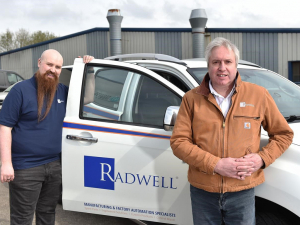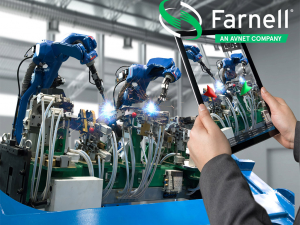Mechanical engineering is hungry for startups

Creating and conquering future markets with young companies - more and more machine builders are making this their motto. The search for suitable partner companies and cooperation models thus becomes the central task in mechanical engineering. A startup radar serves as an important starting aid.
‘Not all the smart people work for you’ is what Professor and Open Innovation Pope Harry Chesbrough already wrote in 2003 in the groundbreaking article ‘The Era of Open Innovation’ has meanwhile also become firmly established in many heads of companies in mechanical and plant engineering. If you want to be a leader in the future, you should open up to innovations that emerge outside your own company and thus become a designer of disruptive upheavals in the market yourself. Cooperation with startups is one way to tap such external innovation potential in the company and make it usable. This can range from incremental process innovations to entirely new business models that completely turn the business logic of the company upside down.
First startup study for mechanical engineering and plant construction
The fact that mechanical engineers have recognised the importance of startups is confirmed by a VDMA member survey, which VDMA Startup Machine in cooperation with EBS University of Economics. For the first time, this report shows how open-minded companies in the mechanical engineering and plant construction sector are about startups and how actively they cooperate with young companies. Two thirds of those surveyed are convinced that startups will have a major impact on the success of their industries over the next three years.
Already today, machine and plant manufacturers are progressively cooperating with startups: 55% of the companies surveyed have already cooperated with startups in the last three years - a considerable number as a comparison with other industries shows: According to a survey by the Federation of German Industries (BDI), only 48% of the larger German family-owned companies with more than 50 million annual sales were involved.
Small and medium-sized mechanical engineering companies are also increasingly opening up to such cooperation. 44% of them have already completed at least one project with a startup. According to a study by the RKW Rationalisierungs- und Innovationszentrum der Deutschen Wirtschaft, only 38% of small and medium-sized enterprises in key sectors have already gained experience in cooperation with startups.
As a rule, the cooperation pays off. Almost 70% of the respondents were satisfied with the success of the cooperation. That's courageous. Not surprisingly, therefore, that by 2021 almost three-quarters of those surveyed would already like to co-innovate with young companies.
Key findings of the study:
More than two thirds of the respondents consider startups to be strategically relevant for their industry. More than half of the respondents already work with startups today - almost three quarters would like to start doing so in the next few years. Almost 70% of the companies that already work with startups are satisfied with the success of the cooperation.
- The top motives are access to new technologies and new business models as well as products.
- The most frequently used form of cooperation among the startup shares of mechanical engineers is project-related cooperation.
- The study is now available to VDMA members and interested members of the public.
Motives for cooperation with startups
There are many reasons for cooperating with startups. 93% of those surveyed stated that they wanted to gain access to new technologies and process knowledge through cooperation. 90% of those surveyed aim to develop new products and business models. Startups in technology topics of the future such as Industry 4.0/Industrial Internet of Things (IIoT) (93%) or Data Analytics and Artificial Intelligence (83%) are particularly popular with machine and plant manufacturers. Cooperation with young companies is therefore a good way to develop future technologies and make them quickly usable in the company and in the development of new products. Startups increase the speed in the company and help to shorten the time to market of an idea. At the same time, they make it possible to test out new ideas beyond the company's classic core business.
Successful models of cooperation with startups
A broad spectrum of cooperation and innovation models is available for cooperation with startups. These include simpler forms of cooperation such as project-related cooperations, but also longer-term partnerships such as customer-supplier relationships or joint ventures. And more and more companies are also using their own innovation models such as accelerators or corporate venture units. Particularly popular in mechanical and plant engineering are flexible, purpose-built cooperation models that are easy to set up and bring immediate benefits. At 75% and 56%, respectively, project-related cooperation and the customer-supplier relationship are currently the most frequently used practices by machine and plant manufacturers. They require a relatively small amount of resources and are therefore an optimal entry model for machine builders into startup cooperation. This makes them particularly attractive for small and medium-sized enterprises. The downside of flexibility and low commitment, however, is that long-term participation in the startup is limited.
If a company is willing to commit itself in the long term and is not afraid of high resource costs, the operation of equity-based internal innovation initiatives such as Corporate Business Acclerators or Corporate Business Labs can be considered. Corporate Business Acclerators are independent business units in which startups with an already established business model are supported for a limited period of time in their rapid development. Corporate Business Labs are initiatives in which company representatives develop new innovations independently or collaboratively with external partners. They are more costly to implement and operate, but bring high potentials with them, as external startups can be strategically bound or a new innovation culture can be initiated in the company. So far, corporate business accelerators have only been used by 15%, corporate business labs by 30% of the experienced machinery and plant manufacturers. But their attractiveness is increasing: by 2021 almost 50% of those willing to cooperate want to have such innovation laboratories implemented in their companies. Which cooperation and innovation models are ultimately chosen depends on the company's specific goals and resources. It is important that a strategic fit is given.
Startup scouting as a challenge
Before cooperating with startups, however, the screening of startup trends and the scouting of candidates in the international and diffuse startup scene must be carried out. This is a complex and extensive task. As many as 42% of startup-affine machine and plant manufacturers take up this challenge and operate their own startup scouting - of which 23% are small and medium-sized enterprises. However, this also clearly shows that a large number of companies need support with startup searches and matchmaking.
VDMA Startup Radar
In April 2019, VDMA Startup-Machine will publish the VDMA Startup-Radar, a machine-learning-based instrument that can be used to track down startup trends and startup contacts with mechanical engineering relevance worldwide, in order to support machine and plant manufacturers in this strategic corporate task. The product was developed in cooperation with the Berlin business intelligence provider AtomLeap. The startup radar provides VDMA members with a navigation aid through the extensive and heterogeneous startup landscape. It acts as a guide by breaking down the topic fields in which startups are active (so-called startup action fields). It provides information on current trends in startups, the global distribution of startups (‘hotspots’) and financing trends along the fields of action. It is also a search tool in which VDMA members receive a searchable longlist in which startups are broken down by topic in addition to the publication. The Startup Radar thus supports VDMA members in finding and addressing suitable cooperation partners. The focus is on startups with mechanical engineering relevance whose skills and services complement those of our industry.
In order to win these startups, AtomLeap collects data from young companies worldwide using specially developed software. AtomLeap uses machine learning techniques to process and interpret the large data sets. This enables the identified startups to be grouped thematically in order to identify the main fields of action for startups in mechanical engineering. Machine Learning-based cluster analysis is based on the Pareto principle: Eight fields of action were identified, accounting for more than 80% of the startups identified worldwide.
As different as the individual startup requirements along the different mechanical engineering clusters and companies may be, in the Startup Radar VDMA members will find a scouting tool that is useful and informative for everyone. On the one hand, the Startup Radar serves companies that are still at the beginning of the Startup cooperation by providing them with an entry instrument with important context information and an integrated contact list. On the other hand, companies that carry out their own startup scouting also benefit by being able to validate and enrich their own results.
Similar articles
More from VDMA
- The growth of automated industries in Germany compared to Europe 5th November 2019
- Mechanical engineering is hungry for startups 3rd April 2019












Write a comment
No comments